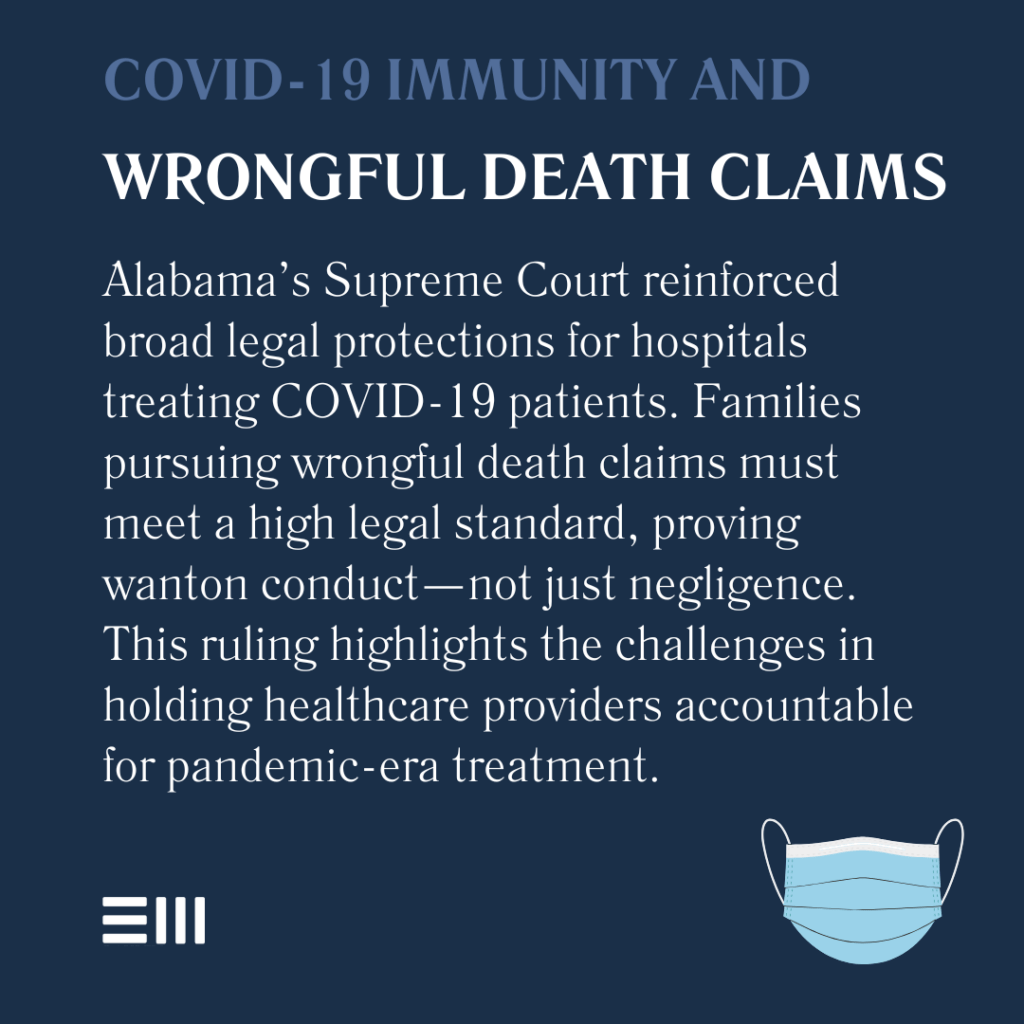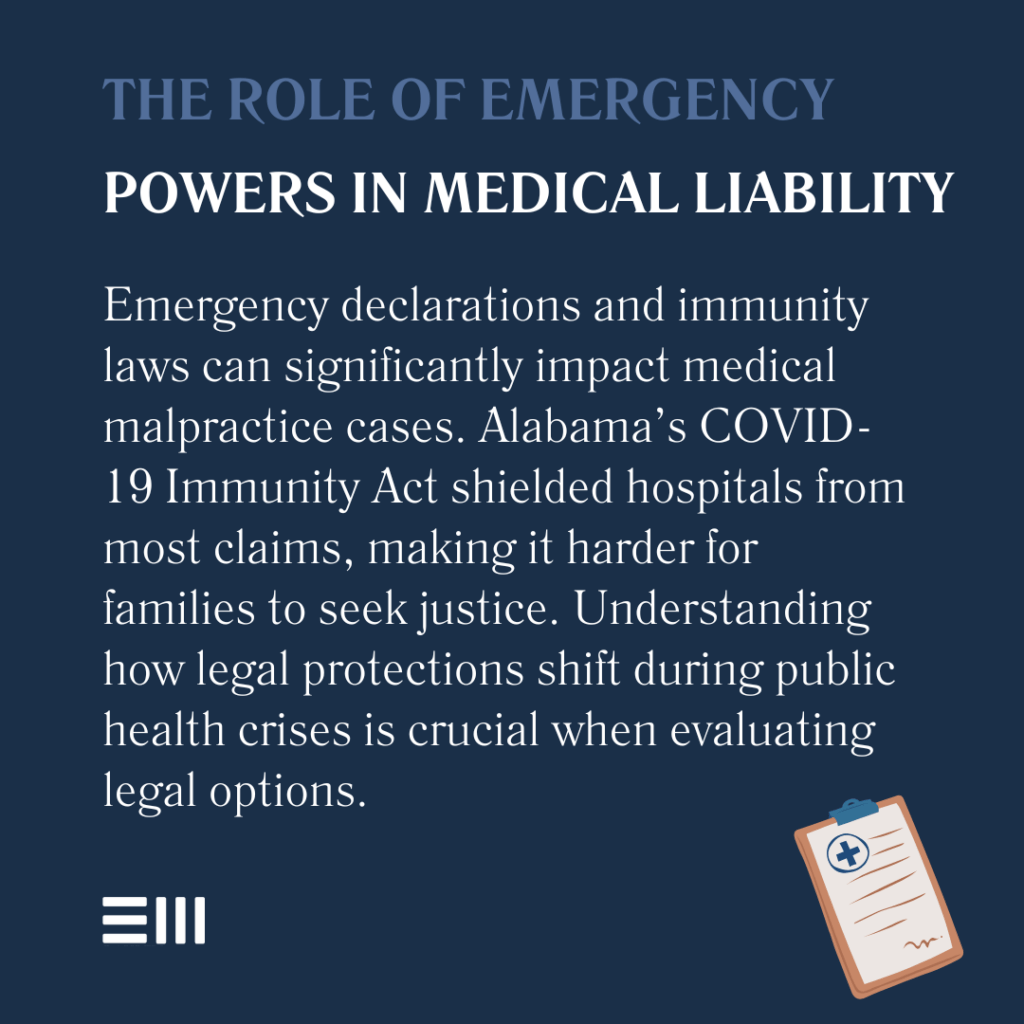
A recent Alabama Supreme Court ruling reinforces legal protections for healthcare providers during the pandemic, highlighting the challenges families face when seeking accountability for COVID-era medical care.
Case Background
In a decision with far-reaching implications for Alabama families affected by COVID-19, the Supreme Court of Alabama has ruled in favor of a hospital’s immunity from a wrongful death lawsuit stemming from pandemic-era care.
The case began when Theresa Johnson, both individually and as executor of her deceased husband Nathaniel Johnson’s estate, filed a wrongful death action against Jackson Hospital & Clinic, Inc.
According to court records, Nathaniel Johnson was admitted to Jackson Hospital on November 26, 2020, while suffering from COVID-19. During his treatment, he was placed on a BiPAP device to assist with breathing.
On December 6, 2020, hospital staff prepared to transfer Nathaniel to another floor. During this transfer, the BiPAP device was removed, and according to the complaint, an oxygen mask was placed on him instead. Court documents indicate that shortly after this change in respiratory support, Nathaniel experienced distress and died.
The Legal Journey
The case’s path through Alabama’s court system illustrates the complex intersection of emergency health measures and personal injury law that emerged during the pandemic.
Initially, the Montgomery Circuit Court granted Jackson Hospital’s motion for summary judgment, effectively dismissing the case. However, the court later set aside this judgment to allow Theresa Johnson’s legal team to conduct further discovery. Johnson’s attorneys argued that Jackson Hospital’s actions constituted wanton conduct and failed to comply with public health guidance related to COVID-19 care.
After reviewing additional evidence, the trial court denied Jackson Hospital’s renewed motion for summary judgment. This decision allowed Johnson’s wrongful death action to proceed under an exception to the Alabama COVID-19 Immunity Act (ACIA).
The Supreme Court’s Decision
The Supreme Court of Alabama took a different view when it reviewed the case on appeal. In its analysis, the court focused on two critical legal shields:
- The Alabama COVID-19 Immunity Act, which provided broad liability protections for healthcare providers during the pandemic.
- Governor Kay Ivey’s May 8, 2020 proclamation, which specifically extended liability protections to healthcare providers treating COVID-19 patients.
The Supreme Court determined that these provisions immunized Jackson Hospital from Johnson’s negligence claims related to COVID-19 treatment. Furthermore, the court found that Johnson had not presented “clear and convincing evidence” of wanton conduct by the hospital staff—the legal standard required to overcome immunity under these emergency provisions.
Based on these findings, the Supreme Court granted Jackson Hospital’s petition for a writ of mandamus, directing the trial court to enter summary judgment in favor of the hospital on all claims.

Implications for Alabama Families and Healthcare Providers
This ruling has significant implications for both Alabama families who lost loved ones during the COVID-19 pandemic and the healthcare providers who treated them:
- High Bar for COVID-19 Claims: The decision reinforces the extremely high legal threshold families must meet to pursue claims for alleged medical errors during pandemic care. Under Alabama law, showing simple negligence is not enough—plaintiffs must demonstrate “wanton conduct,” which requires proof that providers consciously disregarded known risks.
- Emergency Powers Impact: The case highlights how emergency proclamations during public health crises can significantly alter traditional legal remedies, potentially limiting accountability options for affected families.
- Estate Planning Considerations: For Alabama families, this case underscores the importance of comprehensive estate planning, including advance healthcare directives that clearly document care preferences, especially during public health emergencies.
- Documentation Requirements: For healthcare providers, the ruling emphasizes the critical importance of thorough documentation of all treatment decisions, particularly when deviating from standard protocols during emergency situations.
The intersection of emergency powers and regular medical standards creates a complex legal landscape that requires specialized legal knowledge to navigate effectively.
Understanding Your Legal Options
For Alabama families who lost loved ones during COVID-19 hospitalization, this ruling does not completely eliminate legal options, but it does illustrate the challenging landscape they face. Important considerations include:
- Timing Requirements: Wrongful death claims in Alabama have strict filing deadlines, generally two years from the date of death.
- Standard of Proof: Cases alleging medical errors during COVID-19 treatment face the elevated “clear and convincing evidence” standard for wanton conduct.
- Medical Records: Thorough review of complete medical records by qualified experts remains essential to determining whether immunity provisions apply.
- Estate Documentation: Proper appointment of personal representatives is critical, as only the estate’s legally appointed representative can bring a wrongful death action in Alabama.
Understanding these critical factors can make the difference between having a viable legal claim and being barred by immunity provisions that were specifically designed for extraordinary circumstances like the COVID-19 pandemic.

Preparation and Protection
For Alabama residents concerned about healthcare decisions and potential liability issues, this case serves as a powerful reminder of several important preventive steps:
- Ensure all family members have updated advance directives and healthcare powers of attorney;
- Maintain detailed records of all medical treatment recommendations and decisions;
- Understand how emergency declarations might impact standard medical protocols during crises; and
- Consider consulting with an experienced estate planning attorney to ensure all documents reflect current wishes and legal standards.
Taking these proactive steps can provide Alabama families with greater protection and peace of mind, particularly during times when emergency measures may alter the standard healthcare and legal landscape.
The Path Forward
As Alabama continues to process the legal aftermath of the COVID-19 pandemic, cases like Johnson v. Jackson Hospital establish important precedents that will shape how future health emergencies are handled in the courts.
While healthcare providers have received significant legal protections, the courts continue to recognize that truly egregious conduct can still result in liability.
For families navigating these difficult circumstances, having knowledgeable legal guidance is more important than ever in understanding the complex interplay between emergency powers, immunity provisions, and traditional medical liability standards.
Fight Harder, Fight Smarter With Baxley Maniscalco
If you or a loved one has been affected by potential medical malpractice or if you need assistance with estate planning to protect your family’s future, the experienced attorneys at Baxley Maniscalco are here to help.
Our team has decades of combined experience representing clients in complex personal injury and family matters throughout Alabama. We work tirelessly to get the results our clients need, and we’re not afraid to take cases to trial if necessary to secure the compensation you deserve.
Don’t navigate these complex legal matters alone.
Schedule a consultation with our team to discuss your case and learn how we can help protect your rights and interests.
Can't find what you're looking for? Search our site below.










